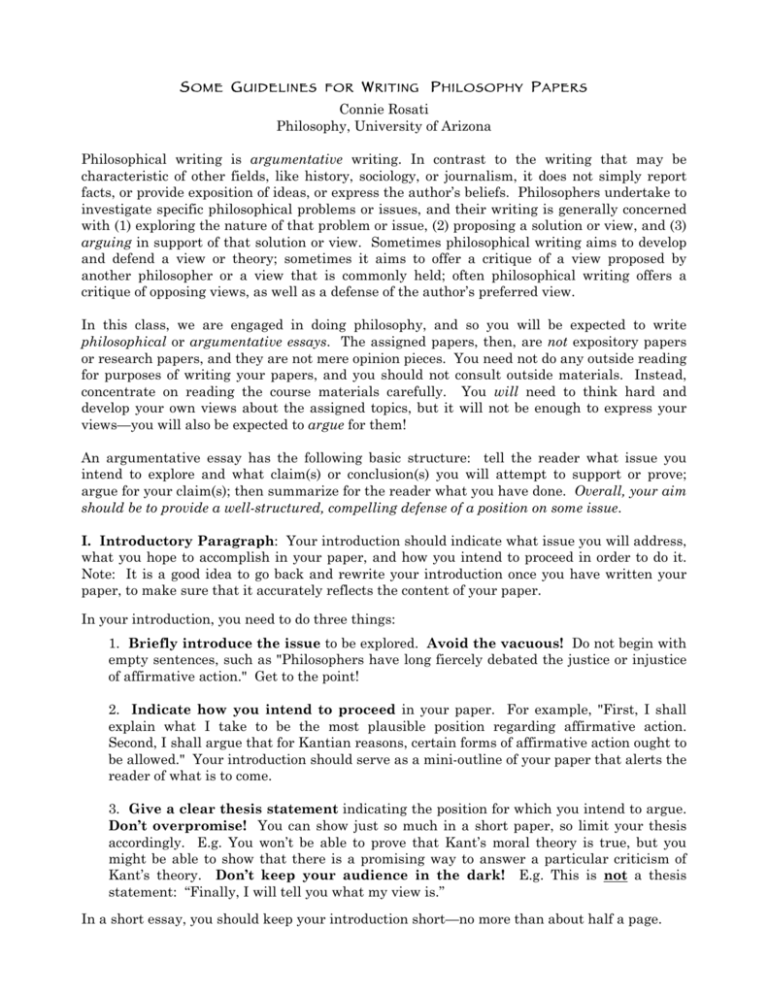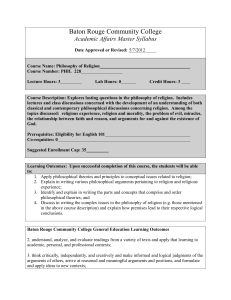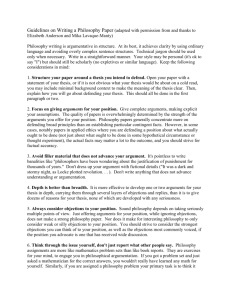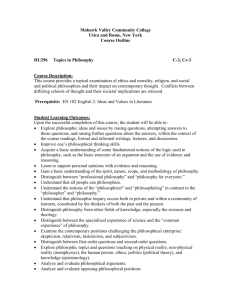Connie Rosati, How to Write a Philosophy Paper
advertisement

S OME G UIDELINES FOR W RITING P HILOSOPHY P APERS Connie Rosati Philosophy, University of Arizona Philosophical writing is argumentative writing. In contrast to the writing that may be characteristic of other fields, like history, sociology, or journalism, it does not simply report facts, or provide exposition of ideas, or express the author’s beliefs. Philosophers undertake to investigate specific philosophical problems or issues, and their writing is generally concerned with (1) exploring the nature of that problem or issue, (2) proposing a solution or view, and (3) arguing in support of that solution or view. Sometimes philosophical writing aims to develop and defend a view or theory; sometimes it aims to offer a critique of a view proposed by another philosopher or a view that is commonly held; often philosophical writing offers a critique of opposing views, as well as a defense of the author’s preferred view. In this class, we are engaged in doing philosophy, and so you will be expected to write philosophical or argumentative essays. The assigned papers, then, are not expository papers or research papers, and they are not mere opinion pieces. You need not do any outside reading for purposes of writing your papers, and you should not consult outside materials. Instead, concentrate on reading the course materials carefully. You will need to think hard and develop your own views about the assigned topics, but it will not be enough to express your views—you will also be expected to argue for them! An argumentative essay has the following basic structure: tell the reader what issue you intend to explore and what claim(s) or conclusion(s) you will attempt to support or prove; argue for your claim(s); then summarize for the reader what you have done. Overall, your aim should be to provide a well-structured, compelling defense of a position on some issue. I. Introductory Paragraph: Your introduction should indicate what issue you will address, what you hope to accomplish in your paper, and how you intend to proceed in order to do it. Note: It is a good idea to go back and rewrite your introduction once you have written your paper, to make sure that it accurately reflects the content of your paper. In your introduction, you need to do three things: 1. Briefly introduce the issue to be explored. Avoid the vacuous! Do not begin with empty sentences, such as "Philosophers have long fiercely debated the justice or injustice of affirmative action." Get to the point! 2. Indicate how you intend to proceed in your paper. For example, "First, I shall explain what I take to be the most plausible position regarding affirmative action. Second, I shall argue that for Kantian reasons, certain forms of affirmative action ought to be allowed." Your introduction should serve as a mini-outline of your paper that alerts the reader of what is to come. 3. Give a clear thesis statement indicating the position for which you intend to argue. Don’t overpromise! You can show just so much in a short paper, so limit your thesis accordingly. E.g. You won’t be able to prove that Kant’s moral theory is true, but you might be able to show that there is a promising way to answer a particular criticism of Kant’s theory. Don’t keep your audience in the dark! E.g. This is not a thesis statement: “Finally, I will tell you what my view is.” In a short essay, you should keep your introduction short—no more than about half a page. 2 II. Body: The body of your paper should develop your analysis of the issue and present your arguments for your position, and it should follow the mini-outline you have provided in your introduction (see 2 above). The body of your paper will have three basic parts: 1. Exposition. Following your introduction, and depending on the assigned topic, you may need to give a brief exposition or summary of the view or argument that you have been asked to examine. E.g. Briefly present the “diversity argument” for affirmative action in university admissions. E.g. Briefly explain what a market in kidneys or other body parts would look like. E.g. Briefly explain what is supposed to be morally problematic about factory farming of animals. But remember: philosophy papers are argumentative papers, not expository papers! Your aim in summarizing a view or theory or argument is to prepare the way for your later argumentation. Before you turn to your arguments, you may also need to explain any technical terms or any terms you will use with a special meaning. Keep in mind that the same word can mean different things to different people, and sometimes words have special meanings in the context of philosophical debates. E.g. The word ‘person’ has a special meaning in philosophical discussions of abortion. So be careful to explain what you mean by words or expressions that might be ambiguous or confusing, either by defining them or by giving an example to indicate how you will be using them. In addition, you should state any crucial assumptions you will rely on for purposes of your arguments. Be careful though: you can’t assume whatever you like—you should be able to say why your assumptions are reasonable and necessary for your arguments. Ordinarily, your exposition should take up only about a third of the body of your paper— that is to say, most of the body of your paper should be spent giving arguments and responding to objections. 2. Argumentation. Most of the body of your paper should be spent developing your analysis and arguments. E.g. Here, you would explain and develop, one at a time, your three objections to the diversity argument for affirmative action. E.g. Here, you would carefully present your arguments in support of the view that the law should permit the sale of kidneys. E.g. Here, you would argue that factory farming of animals really is (or is not) morally wrong. Note: Your arguments should draw, where relevant, on the theories and readings that have been examined in class. 3. Respond to objections. An important part of defending your view is anticipating and responding to objections. Once you have presented your argumentation, think hard—what would be the most serious objections to what you have written? No dodging or ducking! If you waste your time addressing flimsy objections and avoid the hard ones, that will only make your position look weaker. Focus on the toughest objections. If you encounter an objection you do not know how to answer, you have some options. At the very least, you can—and should—acknowledge the objection and do your best to reply. Alternatively, you might need to rethink your position—maybe your arguments need more work, or maybe your viewpoint isn’t so defensible after all! You can always change your mind, and rewrite accordingly. Philosophical writing can be a process of genuine self-discovery, so be open to the possibility that your ideas and beliefs might change or might be different from what you originally thought. III. Conclusion: Here you simply need briefly (no more than 1/3-1/2 a page) to summarize what you think you have shown. 3 General Advice: In writing your papers… • Stick to the task! Make sure all of the points you discuss are relevant to the issue and to defending your position. Ask of each sentence—does this advance the discussion or argumentation? If not, get rid of it. • Use simple language and be direct! As my first philosophy professor once said, "Obscurity is not profundity." • Avoid appeals to authority! That is to say, avoid the temptation of trying to solve a philosophical problem by appealing to a supposed “authority,” whether it is the Bible, the law, Webster's dictionary, or (heaven forbid!) Wikipedia. Even appeals to science should be avoided. The findings of the sciences may be authoritative on specific factual questions and may be relevant to how we think about a philosophical question, but they are not authoritative on philosophical questions. (E.g. Neuroscience does not show that there is no such thing as free will.) • Avoid emotional appeals! I hope you will find the topics engaging, but an emotional appeal (e.g. “But the fetus has cute little hands and feet!” e.g. “But don’t you feel sorry for the abused unwanted child!”) is not an argument. Don’t tell your readers what you “feel”— tell them what you believe, and give good reasons to support what you believe. • Don’t make things up! Student papers often play fast-and-loose with the facts. You may believe something is true or think you know the facts but be quite mistaken. Sometimes the facts may be in dispute. Be extremely careful when you make empirical or factual claims. Where the facts may be in question, make sure your arguments reflect this. NOTE: Your paper should stick to the prescribed length—e.g. when the instructions ask for a 5-7 pp. paper, the limit is 7 pages. If you find that you have written too much, then edit your paper, cutting unnecessary bits. If you find that you have written less than the minimum, that is a good indication that you need to develop your argumentation. Please leave top & bottom margins of 1 inch and right & left margins of 1.25 so there is room for comments. Your paper should by typed, double-spaced using 12 pt. font. Always keep an extra copy! Proper Citation Practices: Avoid paraphrase—please explain ideas, theories, and arguments in your own words. Avoid lengthy quotations. If you do quote from the reading, cite the material properly—that means quotation marks, author's name, and page numbers. In this class, you do not need to give a formal footnote for assigned materials, simply indicate author and page number in parentheses following the quotation (e.g. Mill, p. 31). You should generally avoid quoting any handouts or powerpoints—again, please explain ideas, theories, and arguments in your own words. If you do find it necessary, e.g., to quote a definition from the powerpoints, then use quotation marks and provide a reference (e.g. PPT, vegetarianism). Do not cite the powerpoints for a quotation that is from the reading—cite the author! It is unnecessary to cite the class lectures. You do not need to, and ordinarily should not, consult materials other than those that have been assigned. But if you have done so, or if you make use of someone else's ideas or arguments, you must cite that source or person and must provide a full and formal reference (AUTHOR, TITLE, PUBLISHER, YEAR, P #). Plagiarism: the attempt to present someone else's ideas or writing as one's own. Examples: • submitting someone else's paper or a professional article for a grade • copying phrases, sentences, or paragraphs from a book, article, or online source and incorporating them into one’s paper without quotation marks and proper attribution • using someone else's ideas or arguments without attributing them to that person • quoting from an article without using quotation marks, even if the article as a whole is attributed to the author 4 These cases vary in degree of seriousness and university penalties vary, but academic dishonesty of any form will be cause for failure and will be reported. Please familiarize yourself with the Student Code of Academic Integrity: http://deanofstudents.arizona.edu/codeofacademicintegrity. In many cases, people are tempted to take “shortcuts” because they are under a lot of pressure or are having personal problems. If you are having any difficulties or are concerned about your work for the course, please come see me. I will do whatever I reasonably can to help. The general criteria to be used in grading your work for this course are the following: • Are your reasoning and writing clear and effective—does your work show development of strong skills in philosophical reasoning? • Does your work demonstrate a good understanding of the positions, theories, and arguments presented in class and an ability to apply them? • Does your work demonstrate a knowledge of the course readings? • Does your work display original or thoughtful treatment of the issue you examine, and a careful defense or criticism of a position on that issue? W HY G OOD S TUDENTS G ET B AD G RADES ON P HILOSOPHY P APERS * Most students find writing a philosophy paper difficult and quite unlike the paper writing they have done before. Good students are often surprised—and dismayed—by the grades they receive on their first philosophy papers. They might have done poorly, or they might just not have done as well as they are used to doing (they are getting Bs when they are used to getting As). What went wrong? Here are some common problems. Not following directions: As explained above, philosophy papers are different from papers in other fields, and the requirements and standards are quite exacting. Do not assume that because you have written good papers in your sociology or English or history classes, you know how to write a philosophy paper! Pay careful attention to any instructions that you have received. Paper topics are carefully designed to lead you to explore specific questions and problems. If you do not do what an assigned paper topic asks, or if you do not follow any general instructions for philosophy paper writing that have been provided to you, then the odds are your paper will not be as effective as it might have been. Not playing fair: It is important always to explore views with which you might disagree fully and fairly. Be respectful. If you misrepresent or trivialize opposing views, you will fail to appreciate the strengths of those views, and so your paper will be weak. Likewise, if you are dogmatic about your own view, you will fail to appreciate the weaknesses of your position, and so you will fail to anticipate or adequately address objections to your view. A little humility about your own beliefs can help you to be sensitive to important criticisms and receptive to views that might have more going for them than you realize. Not doing philosophy! It is critical to read assigned materials carefully and understand well the views about which you will be writing. It is critical, too, to follow carefully the paper writing instructions you have received. But having good comprehension and writing a wellstructured paper isn’t enough: you also have to think really hard! If your essay does not reflect your own hard thinking about the topic but merely reiterates ideas and arguments presented in class and in the reading, then your paper will not show that you have engaged with the issue. I am not expecting you to write a paper that shakes the philosophical world! What I am expecting is that you will make an honest effort to give an assigned topic real thought and add your own input where you can. (*I’ve borrowed the idea to include this section, as well as the title and a few of the specific points, from a helpful handout prepared by Dana Goswick, a former graduate student.) 5 A BBREVIATIONS The various abbreviations listed below will be used as a kind of shorthand in commenting on papers. Some come from Jon Wheatley's Prolegomena to Philosophy (Wadsworth, 1970), pp. 79-82; some have been suggested by former teaching assistants. FORMAT AND STRUCTURE T1: Thesis statement needed. If your thesis doesn't appear in your introduction, or if it does, but it isn't sufficiently clear or precise, you'll see this abbreviation. T2: You are overpromising! Your thesis claims more than you can show. HP: Say how you will proceed. Remember—your intro should provide a brief outline. GP: Get to the point. Shorten the lengthy introduction, or shorten the lengthy exposition, and get to the issue. OR: Organization. Your paper would be improved by better organization. Ordinarily, this means you haven’t followed a clear plan or haven’t followed the plan you have set out in your introduction. WRITING AND GRAMMAR E!: “English! That is, bad English. I am not talking here about splitting infinitives or ending a sentence with a preposition, which does not matter at all. Bad English…is usually an ambiguity or unintelligibility with a grammatical origin.” WEM: What exactly does this mean? You will see this expression when a sentence is obscure, ambiguous, muddled, or just plain hard to follow. Try to formulate your points in clear, simple, precise terms. WW: Wrong word. This isn’t the word you meant to use or should have used. URP: “Unreferred pronoun…When you read over a draft of your paper, always ask yourself, of every pronoun, whether or not it refers unambiguously to some suitable noun or noun phrase.” You will see this abbreviation any time the reference of a word or expression is unclear, whether or not the word is a pronoun. UTT: Unexplained technical term. This is a special case of WEM. When you use a term in an unusual or special sense, explain exactly what you take the term to mean. Failure to do this prevents the reader from fully understanding your point. UYOW: Use your own words. You will see this if you are either paraphrasing or using quotations to do the explaining for you. CONTENT AND ARGUMENTATION AUTH: “Using an authority. There are no authorities in philosophy; that is, there is no person such that, if he or she said something, that thing is therefore true. In general, if the only argument for a point is that someone else has made it, then there is no argument for the point and it is best dropped.” BQ: “Begging the question. One begs the question when one fails to answer it, usually by answering another much simpler question instead.” Suppose someone answers the question, “Can one keep a promise by accident?” as follows: “If by ‘keeping a promise’ one means just physically doing what one has said one will do, then keeping a promise by accident is perfectly possible.” As Wheatley explains, “This begs the question because everything that is interesting (and hard) about the original question lies in whether keeping a promise does involve just and only physically doing what one has said one will do.” One also begs the question when one presents a “circular argument”—an argument one premise of which presupposes the conclusion one is trying to defend. Suppose someone is trying to establish the conclusion that God exists, and she argues as follows: 1. The bible says God exists; 2. The bible is the 6 BRQ: CO: EA: EXN: EXP: NAQ: NC: NS: OS: R?: RD: TBS: TF: TNS: revealed word of God; 3. God wouldn’t lie; 4. Therefore, God exists. Steps 2 and 3 presuppose that God exists—the very conclusion the argument is supposed to establish. So the argument is worthless. Bad rhetorical question. It’s best to avoid rhetorical questions in philosophy papers. You may think a point is obvious and true, but it may not actually be true, or it may not be obvious. Wheatley provides this example from a student's paper. "‘Who would ever suppose that man should act from duty alone?’ The ‘obvious’ answer was supposed to be ‘no one.’ The correct answer is ‘To take one example, the great philosopher Immanuel Kant.’" Rhetorical questions can, of course, “be used legitimately. They are so used when the answer really is obvious and this obvious answer is correct. One gets a bad rhetorical question when one or the other of these conditions is not fulfilled.” Comprehension. You will see this when you say something that suggests that you have not understood the materials. E.g. You attribute an idea to an author that is not what the author says. Please review the relevant materials. Emotional appeal. Such appeals do nothing to substantiate a claim. Though it may be good to be emotionally involved in supporting certain issues, and though the views you hold may be correct, logical argument alone will suffice to determine whether those views are true or false. Example needed. You’ll see this when an example would greatly increase the intelligibility of a claim or when you need a better example than you’ve given. Expand or explain further. You haven’t said enough to make this idea clear. Not answering the question. Paper topics are carefully designed to get you to engage with an interesting philosophical problem. If you do not answer the question, you will likely fail to engage with the problem, which will weaken your paper. Be careful to always answer the question posed. You will see this when you make a claim that is either incorrect or misleading. Non-sequitur. “You have a non-sequitur when you say, or imply, that one statement follows from another or some others when it does not.” Overstatement. You make a claim that is exaggerated to the point of being false. Example: “Nobody denies that people have free will.” While it may be true that a lot people believe in free will, certainly not everyone does. Relevance? It isn’t clear how what you say relates or contributes to your discussion. When you write a philosophy paper, ask yourself of each sentence whether it bears on the original problem and whether it moves us further towards the solution of that problem. If any sentence does not fulfill both of these conditions, then cross it out. Redundant. Please try not to repeat yourself unnecessarily. True by stipulation. Example: Suppose you write, "By ‘pain’ I mean that state someone is in when they moan and groan and cry out." This would make it true by definition—by stipulation—that no one can ever pretend to be in pain by moaning and groaning and crying out. “The possibility of pretense has been stipulated out of existence, which is not a useful way to solve a philosophical problem.” Too Fast! You are jumping from idea to idea without explaining the steps in between. This needs support. You will see this next to any statement which is unsupported and which needs support. You will also see it next to any statement which is offered as obvious, but which isn’t obvious. (This handout has taken shape and undergone revision over many years of teaching. But it originally derives from, and still includes materials from, a handout prepared many years ago by my first philosophy teacher, Martin Benjamin, who I here warmly thank once again.)








